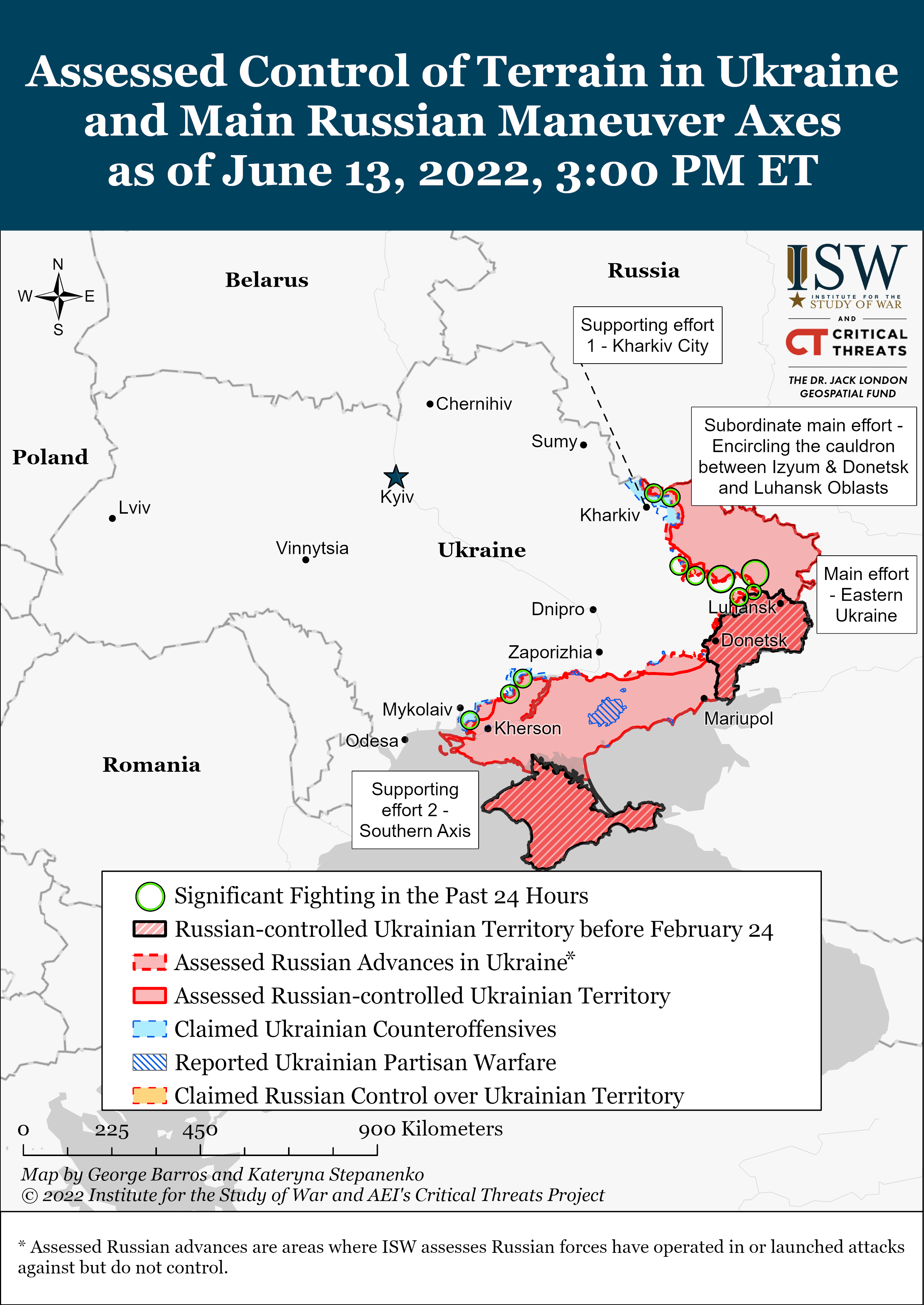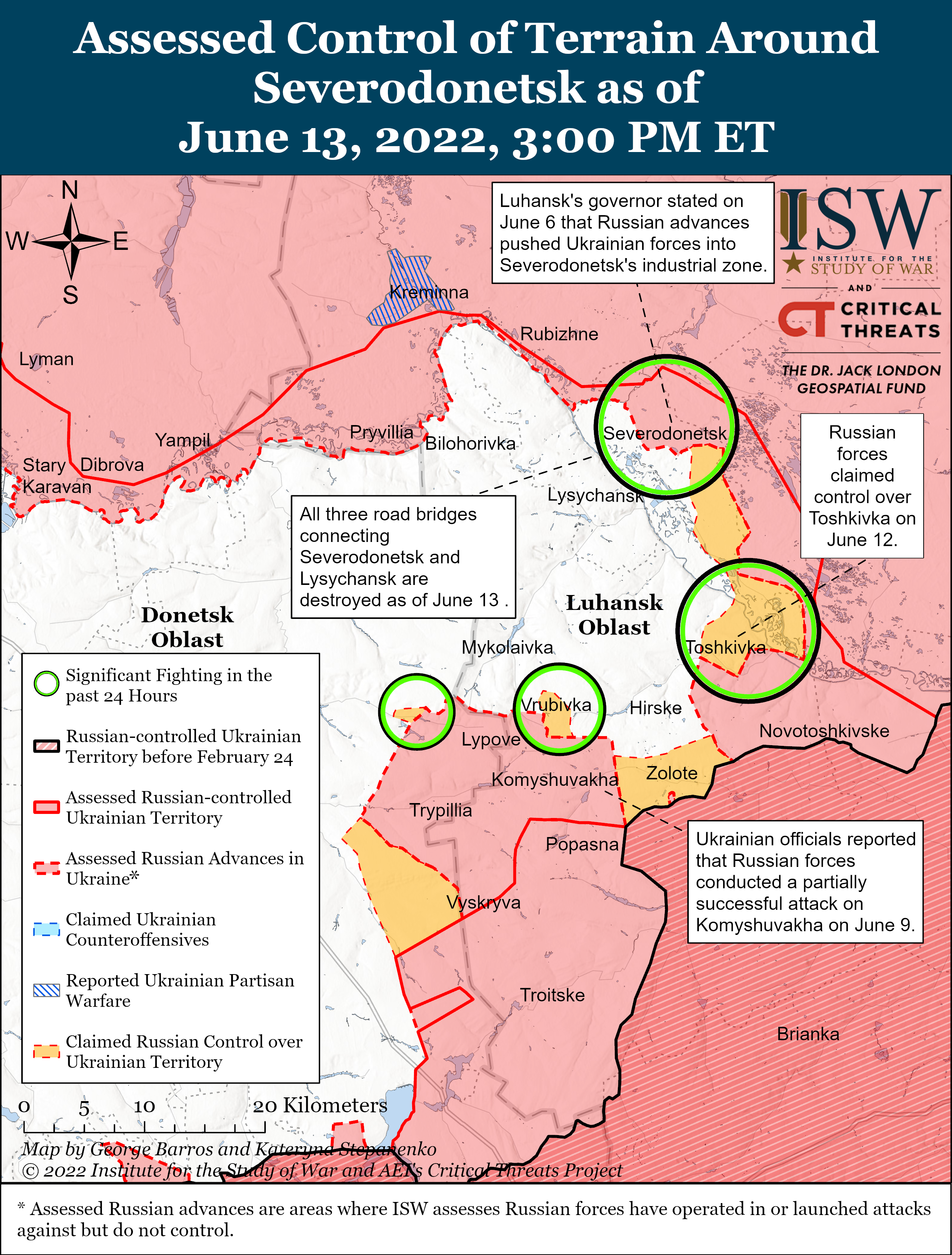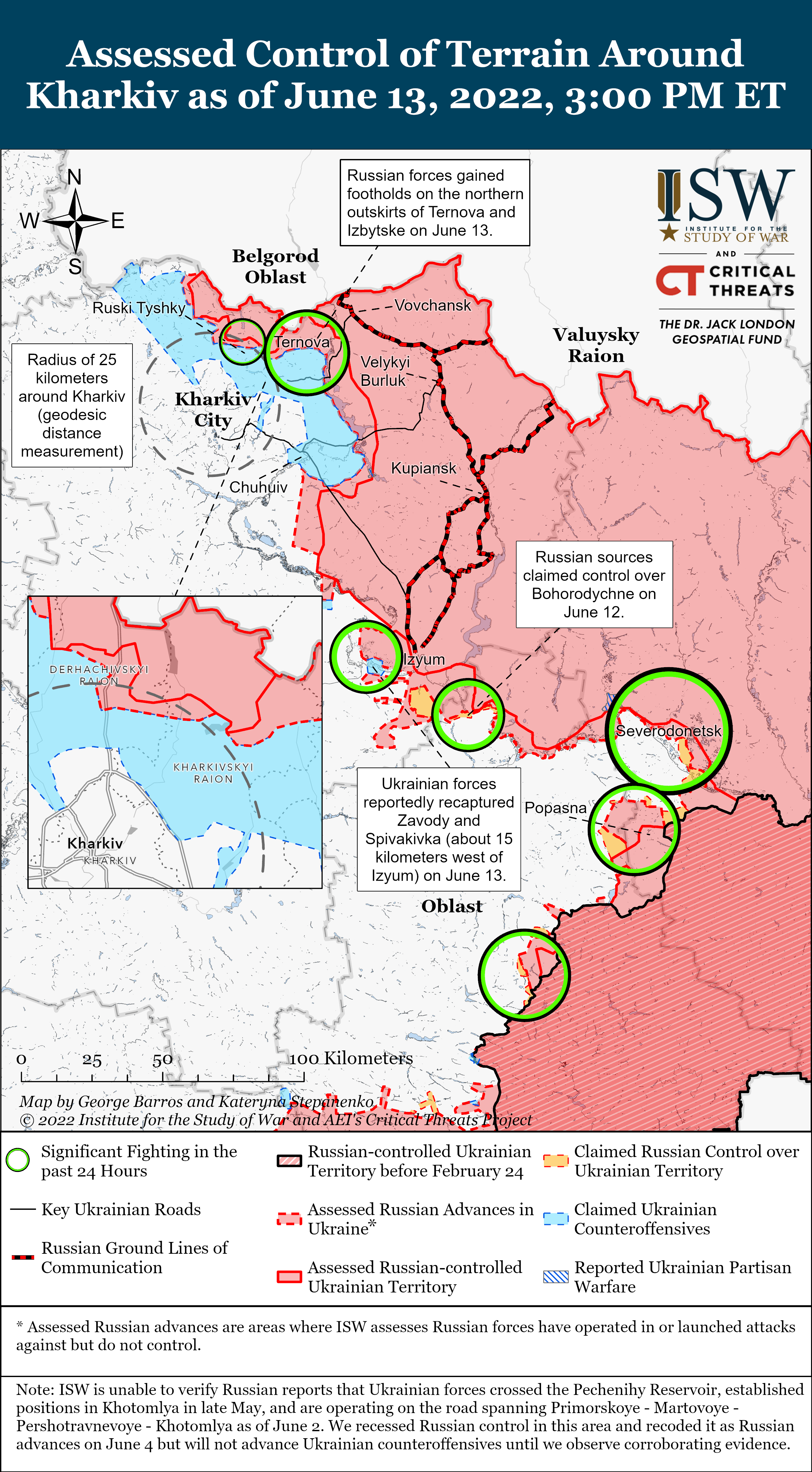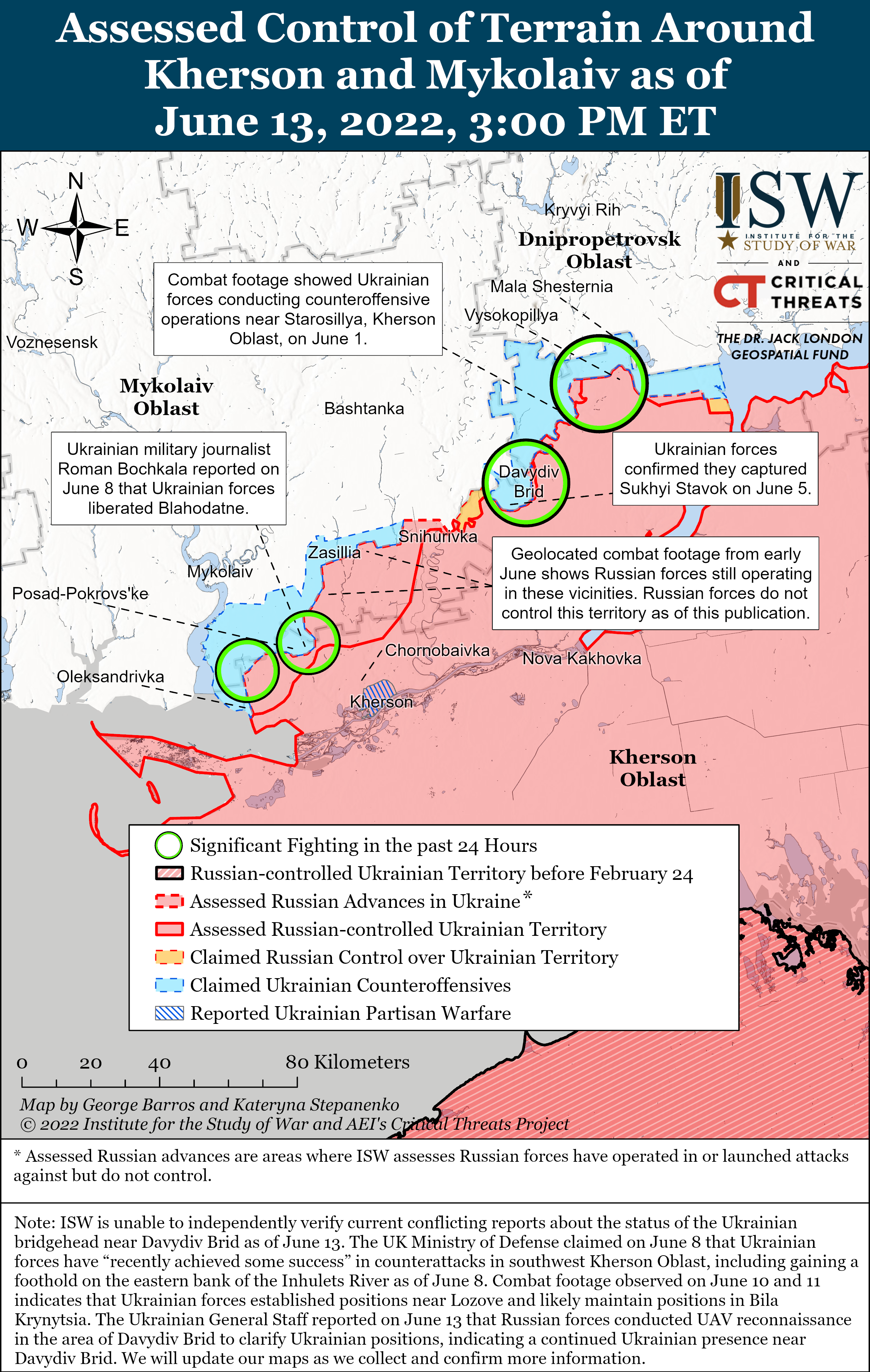RUSSIAN OFFENSIVE CAMPAIGN ASSESSMENT, JUNE 13
Jun 13, 2022 - Press ISW

Russian Offensive Campaign Assessment, June 13
Kateryna Stepanenko, Mason Clark, George Barros, and Grace Mappes
June 13, 7:30pm ET
Click here to see ISW's interactive map of the Russian invasion of Ukraine. This map is updated daily alongside the static maps present in this report.
Kremlin-sponsored outlet Izvestia published and quickly removed an appeal by the First Deputy Head of the Russian Presidential Administration Sergey Kirelenko for Russia to rebuild the Donbas on June 12 and blamed hackers for what they (likely falsely) claimed was a “fake publication.” Izvestia likely intended to save the article for a later date to set informational conditions for Russian annexation of Donbas. Kirelenko’s appeal stated that Russia will restore the Donbas regardless of high costs or if doing so lowers the standard of living in Russia.[1] Izvestia blamed unknown hackers for publishing a “fake article,” but it is possible that hackers instead released an article Izvestia had prepared to publish at a later date. The Kremlin previously published and removed an article prematurely celebrating a Russian victory over Ukraine in late February and discussing the capture of Ukraine in past tense in anticipation of Ukraine’s capitulation during the first Russian-Ukrainian negotiations in Belarus.[2] Unnamed Kremlin officials previously identified Kirelenko as the future head of a new Russian federal district, which would encompass Donbas, and occupied settlements in Kherson and Zaporizhia Oblasts.[3]
Russia continues to deploy insufficiently prepared volunteer and reserve forces to reinforce its ongoing operations. Kremlin-sponsored outlet Izvestia released footage showing Russian artillery reservists undergoing training with old D-20 howitzers reportedly within 10 days of their deployment to Ukraine.[4] The reservists focused on learning how to operate hand-held weapons, despite being reportedly only days away from deploying. Social media footage also showed Russian forces transporting Russian volunteer and reserve units with T-80BV tanks (a variant produced in 1985, as opposed to the modernized T-80 BVM operated by the 1st Guards Tank Army) and BMP-1 armored personnel carriers (which have largely been phased out in favor of the BMP-2) to Belgorod Oblast on June 9.[5] Additional social media footage showed Russian forces transporting T-80BV tanks removed from storage in Moscow Oblast on June 9.[6]
Key Takeaways
- Russian forces pushed Ukrainian defenders from the center of Severodonetsk and reportedly destroyed the remaining bridge from Severodonetsk to Lysychansk on June 13, but Ukrainian officials reported that Ukrainian forces are not encircled in the city.
- Russian forces carried out unsuccessful ground assaults in an attempt to sever Ukrainian ground lines of communications (GLOCs) near Popasna and Bakhmut.
- Russian forces launched unsuccessful offensive operations southeast of Izyum and north of Slovyansk, and are likely setting conditions for an assault on Siversk and northwestern Ukrainian GLOCs to Lysychansk.
- Russian forces are likely conducting a limited offensive directly northeast of Kharkiv City in a likely attempt to push Ukrainian forces out of artillery range of Russian rear areas and secured some successes.
- Russian and Ukrainian forces are engaging in ongoing fighting for Davydiv Brid in northwestern Kherson Oblast.
- Russian occupation authorities likely staged terrorist activity in Melitopol and Berdyansk for Russia Day on June 12.
We do not report in detail on Russian war crimes because those activities are well-covered in Western media and do not directly affect the military operations we are assessing and forecasting. We will continue to evaluate and report on the effects of these criminal activities on the Ukrainian military and population and specifically on combat in Ukrainian urban areas. We utterly condemn these Russian violations of the laws of armed conflict, Geneva Conventions, and humanity even though we do not describe them in these reports.
- Main Effort—Eastern Ukraine (comprised of one subordinate and three supporting efforts);
- Subordinate Main Effort—Encirclement of Ukrainian troops in the cauldron between Izyum and Donetsk and Luhansk oblasts
- Supporting Effort 1—Kharkiv City;
- Supporting Effort 2—Southern Axis;
- Activities in Russian-occupied Areas
Main Effort—Eastern Ukraine
Subordinate Main Effort—Southern Kharkiv, Donetsk, Luhansk Oblasts (Russian objective: Encircle Ukrainian forces in Eastern Ukraine and capture the entirety of Donetsk and Luhansk oblasts, the claimed territory of Russia’s proxies in Donbas)
Russian forces conducted offensive operations in Severodonetsk and pushed Ukrainian forces away from the city center on June 13 but did not fully capture the city. Ukrainian Defense Ministry Spokesperson Oleksandr Motuzyanyk noted that Russian forces did not entirely clear Severodonetsk of Ukrainian resistance due to Russia’s reluctance to commit its (likely understrength) infantry units and overreliance on artillery and assault aviation for offensive operations.[7] The Ukrainian General Staff added that fighting is still ongoing in Severodonetsk.[8] Luhansk Oblast Administration Head Serhiy Haidai reported that Russian forces destroyed the last remaining bridge from Severodonetsk to Lysychansk and retain a significant artillery advantage over Ukrainian forces.[9] Deputy Head of the Donetsk People’s Republic (DNR) Militia Eduard Basurin blamed Ukrainian forces for destroying the bridge (though it is highly unlikely Ukrainian forces would willingly destroy the bridge while any of their forces remained in Severodonetsk and this claim is likely false) and claimed that Russian forces are entirely encircling remaining Ukrainian troops in Severodonetsk.[10] Haidai denied Basurin’s claims of encirclement, noting that Ukrainian forces still have limited military channels for the evacuation of wounded troops and reinforcements despite the destruction of all three bridges.[11] Haidai specified that Ukrainian authorities could not conduct civilian evacuations and humanitarian efforts because Russian forces damaged the third bridge prior to its destruction on June 13. Geolocated footage showed that Ukrainian forces continued to hold defensive positions around the Azot Chemical Plant on June 12.[12] The Ukrainian General Staff reported that Russian forces also conducted unsuccessful offensive operations on Metolkino, approximately 4km east of Severodonetsk.[13]
Russian forces unsuccessfully attacked settlements adjacent to Ukrainian ground lines of communication (GLOCs) south of Lysyschansk. The Ukrainian General Staff reported that Ukrainian forces repulsed Russian assaults on Vrubivka, a settlement on a connecting road to the Lysychansk-Bakhmut T1302 highway.[14] Russian forces reportedly resumed ground assaults near Zolote, a settlement adjacent to the Ukrainian GLOCs along the T1303 highway to Lysychansk.[15] A Luhansk People’s Republic (LNR) Militia commander (under the pseudonym Chapai) claimed that Russian forces seized Toshkivka, approximately 4.5km east of the T1303, but the Ukrainian General Staff reported that Russian forces continued to shell Ukrainian positions in the settlement on June 13, indicating fighting likely remains ongoing.[16] Russian forces reportedly conducted unsuccessful assaults on Kodema and Novoluhanske - approximately 15 and 21km south of Bakhmut, respectively.[17] Pro-Russian Telegram Rybar claimed that elements of the Russian Wagner Group have been fighting in Pokrovske (12.5km east of Bakhmut) since June 11, but Ukrainian sources stated that Russian forces are carrying out aerial reconnaissance in the settlement.[18]
Russian forces launched unsuccessful offensive operations southeast of Izyum and in settlements north of Slovyansk but did not resume assaults in the Lyman area on June 13. The Ukrainian General Staff reported that Russian forces attacked Bohorodychne, approximately 25km southeast of Izyum, but only secured the northwestern outskirts of the settlement.[19] Russian forces also launched an unsuccessful assault on Dolyna, a settlement along the E40 highway to Slovyansk.[20] Ukrainian military journalist Andriy Tsaplienko reported that Ukrainian forces are conducting counteroffensives just west of Izyum and have liberated Zavody and Spivakivka, but Ukrainian officials did not confirm this report.[21] Russian forces are likely continuing their preparations to cut off Ukrainian GLOCs to Lysychansk from Siversk and the northwest. Russian forces reportedly shelled Maiaky (just five kilometers northeast of Siversk) and transferred up to 80 units of military and artillery equipment to Kreminna and Starobilsk.[22] LNR Ambassador to Russia Rodion Miroshnik claimed that Russian forces will likely simultaneously attack Lysychansk and Siversk to block Ukrainian forces from retreating to Slovyansk.[23] Russian forces likely seek to set conditions for direct assaults against Siversk and settlements northwest of Lysychansk in the next two weeks.
Russian forces did not conduct any offensive operations east or west of Avdiivka on June 13 and continued to shell surrounding settlements.[24] Ukraine’s Joint Forces Task Force reported liberating three unnamed settlements and pushing back the line of contact by 15km in Donetsk Oblast, though ISW cannot independently verify this claim.[25]
Supporting Effort #1—Kharkiv City (Russian objective: Withdraw forces to the north and defend ground lines of communication (GLOCs) to Izyum)
Russian forces are likely conducting a limited offensive directly northeast of Kharkiv City in a likely attempt to push Ukrainian forces out of artillery range of Russian rear areas. Russian forces made incremental territorial gains in settlements along the Ukrainian-Russian border northeast of Kharkiv City on June 13. The Ukrainian General Staff reported that Russian forces launched partially successful ground assaults on the border settlements of Ternova and Izbutske, approximately 40km northeast of Kharkiv City, and secured the northern outskirts of Izbutske.[26] Pro-Russian Telegram channel Rybar claimed that Russian and Ukrainian forces are engaging in trench and artillery warfare in Tsupivka and Velyki Prokhody, just west and east of the Kharkiv City-Belgorod City highway.[27] Geolocated footage confirmed that Ukrainian forces continued to target Russian ammunition storages in Velyki Prokhody.[28] Kharkiv Oblast Head Oleg Synegubov reported that Russian forces launched MLRS strikes on residential areas of Kharkiv City overnight.[29]
Supporting Effort #2—Southern Axis (Objective: Defend Kherson and Zaporizhia Oblasts against Ukrainian counterattacks)
Ukrainian forces reportedly continued to gradually attack Russian positions on the eastern bank of Inhulets River in northwestern Kherson Oblast. The Ukrainian Southern Operational Command noted that Ukrainian and Russian forces engaged in heavy fighting in the Davydiv Brid area, an operationally significant settlement situated on the eastern Inhulets riverbank and on Russian ground lines of communication (GLOCs) along the T2207 highway.[30] The Ukrainian General Staff reported that Russian forces conducted aerial reconnaissance over Davydiv Brid, but the scope of Ukrainian advances in the settlement remains unclear.[31] Russian forces continued to fortify their positions and reportedly strengthened the grouping of troops in areas near the Dnipropetrovsk-Kherson Oblast border.[32]
Ukrainian artillery struck Russian fuel and ammunition depots in Polohy, approximately 60km west of Zaporizhia-Donetsk Oblast border.[33]
Activity in Russian-occupied Areas (Russian objective: consolidate administrative control of occupied areas; set conditions for potential annexation into the Russian Federation or some other future political arrangement of Moscow’s choosing)
Russian authorities may have staged false flag attacks in Melitopol and Berdyansk on June 12, likely to accuse Ukrainian partisans of targeting civilians. Self-proclaimed head of the Zaporizhia Oblast Military-Civilian Administration Vladimir Rogov made a preliminary announcement that “terrorists” staged three explosions in Berdyansk, before retracting his statements and identifying the situation as an accident at the electrical station.[34] Rogov falsely maintained that Berdyansk residents attribute any emergency in the city to Ukrainian efforts to disturb peaceful life in “liberated” (Russian-occupied) regions. Self-proclaimed deputy head of the Zaporizhia Oblast Internal Affairs Ministry Alexei Selivanov also claimed that unknown assailants planted an explosive device in Melitopol to disrupt Russia Day (the day of adoption of the declaration of Russian state sovereignty after the collapse of the Soviet Union).[35] Zaporizhia Oblast Military Administration Head Oleksandr Starukh noted that Ukrainian authorities warned that Russian forces could stage terrorist activity prior to Russia Day.[36]
Russian occupation authorities continue to face personnel shortages that impede their occupation measures. The Ukrainian Military Intelligence Directorate (GUR) reported that Russian forces in Mariupol were unable to recruit collaborators by promising individual applicants 10,000 rubles per month and switched to offering payments in food supplies, given the dire humanitarian situation in the city.[37] The GUR added that Russian occupation authorities are inviting any volunteers to clear out rubble and dead bodies in Mariupol. Mariupol Mayor’s Adviser Petro Andryushenko noted that the Russian occupation authorities are restricting access to humanitarian aid for individuals younger than 65 years of age.[38] Russian occupation authorities in Mariupol may be attempting to gain the support of elderly citizens and coerce younger residents to work with Russian forces in exchange for food. Russian occupation authorities additionally deployed Donetsk People’s Republic (DNR) police officers to patrol Kherson City.[39] The GUR also noted that Russian occupation authorities are recruiting teachers without pedagogical education and transporting educators from Crimea to replace Melitopol teachers that refused to teach Russian curriculums.[40] Russian occupation authorities are also attempting to bribe civilians by offering debt forgiveness of all loans taken from Ukrainian banks.[41]
Russian occupation authorities continue to introduce new titles for personnel that agreed to cooperate with the Kremlin and its proxies. The Donetsk People’s Republic Head (DNR) Denis Pushilin appointed previous Ukrainian Mayor of Sviatohirsk Vladimir Bandura as the new Sviatohirsk Administration Head after Bandura agreed to cooperate with Russian forces.[42] Russian occupation authorities have seemingly eliminated the position of mayor in occupied settlements, likely to fully institute their own governance structures rather than taking over existing structures.
Russian occupation authorities are continuing to exploit Ukrainian agrobusiness and have reportedly banned the export of crops to Ukrainian government-controlled territories from Russian occupied settlements.[43] The GUR also noted that Russian forces are coercing Kherson Oblast businessmen and farmers to hand over 70% of their harvest to Crimean buyers at low profit margins.
Above is available daily from: https://www.understandingwar.org/backgrounder/russian-offensive-campaign-assessment-june-13?campaign_id=249&emc=edit_ruwb_20220614&instance_id=64035&nl=russia-ukraine-war-briefing®i_id=53444314&segment_id=95116&te=1&user_id=8a776225d84f290294e4274317e366a5





No comments:
Post a Comment